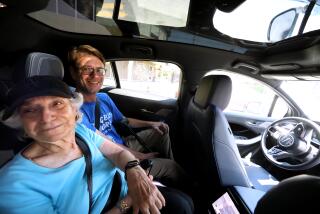Our twisted relationship with the GPS
Irvin Gordon has put 2.9 million miles on his 1966 red Volvo, earning himself a place in the Guinness Book of World Records.
He has crossed the country at least 45 times and rarely gets lost. Still, six years ago, he went out and bought himself a TomTom, not so much because he required navigational assistance but because he missed having someone to argue with.
“I argue with her all the time. A lot of times I know better than she does what’s the best route,” boasts Gordon, 70, a retired science teacher from Long Island, N.Y., who started driving 100,000 miles a year after his divorce in 1996, just because he could. His GPS reminds him of his ex-wife.
They were supposed to just help us get around, but the little devices suction-cupped to the dashboard, built into the car or tucked away in the cellphone have taken on an unexpectedly human presence in our roadway lives. We give them names: Libby (short for “the Lady in the Box,”) Shirley, Bruce, Bernard and Shehu (as in “She Who Must Be Obeyed”).
“I’ve been calling my C330 Paula after my first wife because she was always telling me what to do, too,” a user known as Donicus from Lewisville, Texas, wrote on a Web page devoted to people who felt compelled to name their global positioning satellites the way they would the dog, except not exactly, because the dog can’t talk.
No one seems to recall Grandma chatting with the toaster or forming a personal attachment with the coffee pot. Yet the GPS has much of our otherwise techno-savvy generation tooling around town arguing over the next left turn with a box the size of a bar of soap.
We holler at them (“Turn here? Are you crazy?”), suspect them of malice (“I think my GPS is trying to get me arrested”), refuse to leave home without them, ignore them and slavishly obey them to the point of driving into a ditch.
“It’s the voice — we as human beings are voice-obsessed,” said Clifford Nass, a Stanford University professor and author of “The Man Who Lied to His Laptop: What Machines Teach Us About Human Relationships.”
At 1 day old, a baby can distinguish a human voice from any other sound. From that point on, Nass said, our brains are wired to respond. “The fact that the GPS has a voice makes it more powerful than any other technology without a voice,” he said, “be it your computer or your toaster oven.”
This explains why people around the world have followed their navigational nemeses to unfortunate ends.
Recall the British woman who steered her Mercedes sports car into a river when her GPS pointed her down a farm road clearly marked “unsuitable for motor vehicles”; the Swiss delivery truck driver who sailed past several No Entry signs and into a cherry tree; the Ohio woman who let hers take her into the path of an oncoming train, where a police officer rescued her in the nick of time; and the Seattle bus driver who drove his 12-foot-high bus under a 9-foot concrete bridge, inspiring the headline: “Bus Driver Chooses GPS Over Gigantic Road Sign, Plows Into Overpass.”
“The device is not a substitute for common sense,” said Jessica Myers, spokeswoman for Garmin International in Kansas City, Kan., one of the larger GPS manufacturers. Her favorite episode of “The Office” is the one where Michael Scott obeys his GPS and drives into a pond.
“You still need to follow the rules of the road,” she said. “If the light is red, you need to stop. You’d be amazed.”
Who knew two dozen satellites orbiting Earth since 1994 would drum up so much vehicular Sturm und Drang? Initially launched for the military, the network was approved for civilian use in the 1980s, and now 96 million path-finding wonders are in use in North America alone, according to Canalys, a market research firm that tracks the industry.
That number is expected to more than double by 2015, enabling us to track our children, pets and friends in an array of voices including Homer Simpson (“Woo hoo! You have reached your destination!) and Yoda (“Right you should turn”).
Our talking maps reveal as much about where we are as who we are. If you’re aggressive in social circles, you are likely to verbally abuse your GPS. Don’t like to take orders? You probably ignore it. Passive aggressive? You address your GPS in a shabby tone you wouldn’t dare try with your human friends. Conflict-avoider? You obey.
Debi Tinsley, 51, an actress, jazz singer and legal secretary from Van Nuys, treats the box she dubbed Lady Garmin with more respect than some people show their mothers. “I’ve never said anything mean to her. Once, I just got a bit annoyed when she told me to turn left — into a cement wall.”
Mitch Yockelson, 48, a mild-mannered historian from Annapolis, Md., acquired Shirley when he bought his car in 2005. She came built in.
“I’m very subservient to her,” he said. “When she says, ‘You will turn at the next intersection,’ I get very tense and very nervous. I have issues with women, apparently.”
The name Shirley can be traced to an old girlfriend who, upon hearing the GPS the first time, remarked: “God, that voice is annoying. It sounds like it would be a woman named Shirley,” Yockelson recalled, adding: “I hope that doesn’t offend anyone named Shirley.”
Zita Lefebvre, 55, of La Cañada Flintridge, an executive at Cartoon Network Studios, had this to say when asked to describe her relationship with her GPS: “I hate mine! It sends me to streets that are closed, it has an attitude and I hate to be told what to do.”
Occasionally we find ourselves in our vehicles, alone, screaming, because somewhere in the recesses of our brains we realize our robotic friend only wants to talk; it doesn’t want to listen. We feel disrespected, ignored.
When we hear a voice, we think “person,” and treat it with all the expectations and biases we would a human being. This has occasionally unmasked misogynistic streaks — not only in the aforementioned ex-husbands who hear directional guidance as bossiness and think “ex-wife,” but in the entire nation of Germany, which had to have a product recall when BMW released its built-in GPS system with a female voice because Germans didn’t want to take directions from a woman.
Many drivers consider the GPS the best and worst thing they ever bought, a pocket-sized road map — without the folding challenge — that always gets you home, even if that means Canoga Park by way of Fontana.
But even for those of us who have followed a GPS through the sunken backwaters of Mississippi, when there was a perfectly paved four-lane roadway a mere half-mile away, getting there by any means is still better than getting lost.
More to Read
Sign up for The Wild
We’ll help you find the best places to hike, bike and run, as well as the perfect silent spots for meditation and yoga.
You may occasionally receive promotional content from the Los Angeles Times.






